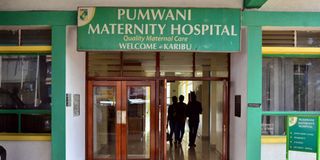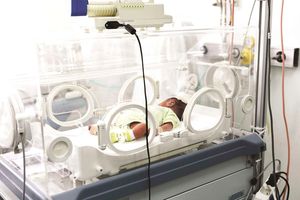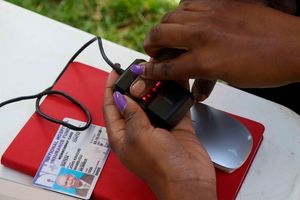Linda Mama a decade on - the good and the bad

Tessie Mudavadi interacts with mothers during a past free maternal screening camp in Nairobi.
What you need to know:
- Recognising the importance of the programme to Kenya's health system, the government expanded it in 2017 to include private and faith-based health facilities.
A decade on, Linda Mama – a critical programme to address the problems pregnant women face in accessing maternal health services – has produced mixed results.
On the one hand, the number of mothers benefiting from the programme has grown to more than one million each year, with the reduction of fees for services during pregnancy, childbirth and postpartum increasing access to skilled childbirth services across the country.
On the other hand, key implementation challenges – mainly budget constraints – are preventing Linda Mama from delivering its full benefits to Kenyan mothers, forcing some to pay out-of-pocket for essential drugs, travel long distances, be detained in hospitals and, in the worst cases, die.
This is based on a new audit of the programme's operations, which highlights the key benefits of Linda Mama and areas where action is needed.
The Auditor-General's performance audit on 'Implementation of the Linda Mama Programme by NHIF' reveals the good, the bad and the ugly of a critical programme that started just as former President Uhuru Kenyatta took office in 2013 and has been part of Kenya's health system for the past decade.

The main entrance to Pumwani Maternity Hospital in Nairobi. It is the largest maternity hospital in East Africa, with more than 20,000 deliveries annually and 100 midwives.
“The overall purpose of the programme was to provide access to high quality and comprehensive preconception and prenatal care. This would result in better health outcomes for mothers and babies, by enabling health care providers to identify and treat health issues early,” the audit notes.
Recognising the importance of the programme to Kenya's health system, the government expanded it in 2017 to include private and faith-based health facilities.
Since 2017, more than 5.2 million mothers have been registered under the programme, with an average of 1.2 million mothers benefiting annually over the past four years, according to statistics from the National Health Insurance Fund (NHIF).
At least 5,635 public health facilities, 437 private health facilities and 164 faith-based health facilities have also been signed up to provide free maternity services.
“The programme has significantly contributed to the increase in the number of beneficiaries accessing skilled maternal and neonatal services. It has ensured the health of the mother and infant are safeguarded,” the audit notes.
In counties such as Kajiado, Kilifi and Garissa, where home deliveries have been rampant in the past, the programme has been a lifeline as more mothers have access to skilled delivery services. With incentives such as reimbursement for traditional birth attendants who accompany mothers to health facilities for delivery and access to delivery rooms, the acceptance of skilled delivery in the communities has increased and is bearing fruit.
However, the programme has also faced a myriad of challenges that have continued to expose mothers across the country to untold suffering, which the Auditor-General notes need to be addressed in order for the programme to fully achieve its objective.
The main challenge has been the continued cost to mothers of accessing maternal services, despite the fact that the main objective of the programme was to eliminate fees to benefit mothers, especially those from poor backgrounds.
This is because the programme does not cover all critical services required during pregnancy, childbirth and postpartum. There is also a lack of uniformity in the services provided in different locations, and budgetary constraints have left the NHIF – the government agency under whose direct control the programme falls – without proper monitoring mechanisms, so it is flying blind, unable to mitigate the challenges faced by mothers and health facilities.
This has led to a situation where mothers have to spend money out of their own pockets to buy drugs and other services that should be covered by the Linda Mama programme, while those who lack the money receive poor services.
The programme covers beneficiaries during the nine months of pregnancy and three months after delivery.
"Interviews with staff at the sampled NHIF offices and health facilities revealed that the programme was not reimbursing costs incurred in treating complications that occur during pregnancy. Instead, NHIF was only reimbursing health facilities for complications that were as a direct result of pregnancy,” the audit established.
It cited medical diagnoses during pregnancy such as malaria, hypertension and kidney complications as some of the conditions that are not covered, despite the higher incidence during pregnancy. For example, between 2016 and 2022, Kenya recorded 571,938 cases of women diagnosed with malaria and 40,976 cases of hypertension during pregnancy.
Medical abortions and ectopic pregnancies are also not covered, with mothers spending between Sh3,500 and Sh8,000 to access these services.
Ultrasound services – which help to estimate gestational age, improve detection of foetal abnormalities and multiple pregnancies, reduce induction of labour for post-term pregnancies and improve a woman's pregnancy experience – are also not covered, forcing about 42 per cent of women to forgo the tests as they cannot afford the cost, which ranges from Sh500 to Sh3,000.
Lack of access to ultrasound services can lead to missed danger signs, resulting in critical complications that could be avoided with early intervention, and even death.
“Failure by the Linda Mama programme to eliminate all financial barriers in accessing maternity services hindered some mothers from accessing all the essential maternity services, including beyond antenatal clinics, delivery and postnatal clinics. This hampers the programme from achieving its objective of addressing inequities in access to quality maternal and newborn healthcare services,” the audit says.
The audit also notes that the programme does not provide for simultaneous admission of mother and baby or for post-delivery readmission after discharge from hospital, a key barrier to adequate access to quality health services.
The Ministry of Health (MoH) and NHIF say multiple admissions are allowed in special circumstances, but at the branch level NHIF officials do not allow claims for costs related to such post-delivery admissions from health facilities.
“In instances where a mother and baby required admission after delivery, health facilities could only admit one of the two at any given time.”
In response, the NHIF said it had “made provisions for multiple admissions within the system. The same will be re-emphasised and communicated to all branches and healthcare providers.”
The NHIF has also been slow to onboard new health facilities to provide the free maternity services, which means that pregnant women have to travel long distances to get to enrolled facilities. And facilities that haven't been onboarded – mainly those at the lower end of the scale – have to bear the cost of providing the services free of charge, but cannot claim reimbursement.
While the process of onboarding facilities should take 14 days after application, some facilities took up to three years.
Of the 12,903 health facilities across Kenya, 7,666 (59 per cent) had been onboarded to provide free maternity services by June last year, leaving a huge gap for full impact.
“As at November 2022, NHIF owed a total of Sh721,153,207 to health facilities nationwide. Health facilities, especially private and faith-based facilities, relied on the funds remitted by NHIF to ensure seamless provision to mothers. Due to the delays, health facilities could not meet all their operating costs. Therefore, there is a likelihood of the quality of the maternity services provided being degraded with the continued delays in the reimbursement of costs,” Auditor-General Nancy Gathungu added in the report.
The NHIF admits that budgetary constraints have hampered its implementation of the programme, as it is unable to cover all essential services during pregnancy, childbirth and post-partum, but argues that the problem can only be addressed by the National Treasury through increased funding.
“The benefit package provides access to maternal health services at the budget available from the National Treasury. Drugs such as Anti-D for Rhesus and ultrasounds are important for expectant mothers. However, this can only be availed if funding is increased from the National Treasury to allow for expansion of the benefit package,” NHIF said in the report.
The audit also notes that there hasn't been adequate sensitisation of health facilities and NHIF branch officials on the services that should be reimbursed, which has led to cases of health facilities and patients paying for Linda Mama services out of their own pockets.
“The NHIF has been limited in its ability to conduct sensitisation exercises targeting Linda Mama stakeholders due to budgetary constraints. However, NHIF is pursuing other options such as collaborating with development partners to finance sensitisation exercises partly or fully,” NHIF said.
But perhaps the biggest challenge has been the inability of NHIF and MoH to monitor and evaluate the programme as planned, which has left the government in the dark, unable to identify the challenges faced by mothers and health facilities and find solutions, and with inconsistencies in the implementation of the programme across the country.
At Kakamega Provincial General Hospital (PGH), for example, at least 103 mothers were detained for up to 60 days last year for failing to produce individual identity cards (IDs), even though the programme's implementation manual allowed their claims to be processed using the IDs of their relatives.
“As a result of not conducting monitoring, evaluation and client satisfaction surveys, NHIF could not identify and mitigate the challenges experienced by service providers and beneficiaries. This contributed to hindering the full realisation of the programme’s intended objectives,” said Ms Gathungu.
County governments have also failed to fully support the programme by ensuring that health facilities have health workers, drugs and utilities such as water and electricity, which affects the quality of maternity services.
“County governments play a vital role in the success of the implementation of the programme. Their failure to adequately support health facilities led to the facilities relying on Linda Mama programme reimbursements to meet their daily operation costs. Consequently, the facilities could not prioritise the utilisation of Linda Mama reimbursements towards the improvement of maternal services, thereby hindering successful implementation of the programme,” it report says.
The government introduced Linda Mama in 2013, with the main aim of eliminating the fees women pay for maternal services at health facilities before and after childbirth, in order to increase access to skilled deliveries and address health complications that have resulted from many mothers having to rely on unskilled traditional birth attendants.
Key stakeholders in the programme include the MoH, NHIF, county governments and health facilities, with the primary beneficiaries being pregnant women, new mothers and infants.
“To ensure that the programme eliminates financial barriers to accessing skilled maternal health services, the MoH and NHIF should include all complications experienced by mothers during pregnancy and the post-partum period of three months in the programme service entitlement,” the Auditor-General recommends.
The Auditor-General also wants NHIF to streamline the process of enrolling health facilities into the programme at head office level, increase the number of facilities offering the service, and make it easier for health facilities to have staff and infrastructure to support the programme.
“To ensure seamless implementation of the programme, county governments should ensure timely and consistent supply of essential drugs and commodities to public health facilities in order to guarantee quality service delivery.
“The MoH and NHIF should conduct continuous monitoring and evaluation of the programme. This will ensure prompt identification of challenges and quality gaps for remedial actions,” the Auditor-General said.





